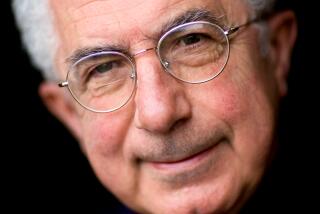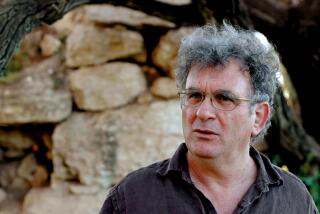Popular Pastimes, Unpopular Books: the Past as Unstudied Prologue
- Share via
LONDON — In medieval times history was called “the school of princes.” Educated people all agreed that study of the past was a necessary preparation for statecraft. So equally, in a democratic age, history ought to be the school of peoples. Yet there is growing evidence that, throughout the West, the teaching of history by our educational systems is in decline, and that knowledge of it, among our governing mass-electorates, is dwindling fast.
History as traditionally taught in the schools, especially the history of one’s own country, is being elbowed aside by more fashionable subjects. Television, which tends to stop children from reading books, does nothing for history: worse than nothing, since it often transmits tendentious travesties of the past. So serious has the situation become that in France, for instance, the government has intervened directly to ensure that history occupies a more prominent place in the classroom. In Britain too, the government is currently devising a new “core curriculum,” with a greater stress on history, which must be followed in all state-supported schools. I would like to see state governments in America consider similar measures.
But government action will not be enough. What is needed also is a change in attitude, especially among academics, to the teaching and above all the writing of history. The past must be taken to the people. I am peculiarly conscious of this problem because, all my working life, I have been both a journalist and a historian. Journalists deal with a mass-readership, historians, as a rule, with elites; so many think the mixture incompatible. Most journalists take no interest in history; academic historians usually despise and distrust journalists.
Yet I have found, from experience, that the combination is fruitful, in both directions. As a journalist for the past 35 years, I have been in close proximity with governments in many parts of the world as they tackled a variety of crises. I have watched leaders under stress: sometimes overwhelmed, sometimes triumphant, often barely surviving, reeling from one disaster to the next. I have seen firsthand the part that misunderstanding, muddle, luck and accident--as well as brilliant intellect and careful planning--play in the shaping of events. I have met presidents and prime ministers, some of whom I have known well, and seen them as human beings, driven by vanity and fear as well as public spirit, people in whom the love of power and a genuine desire to serve their country fight uneasy struggles for mastery. All this illuminates for me the way in which historical figures who lived hundreds of years ago became what they were.
But equally, I find that historical knowledge and training is of immense utility in my work as a journalist, in understanding contemporary events. For all problems have historical roots, usually deep ones. The great archeologist Sir Flinders Petrie once remarked that most people live only on the plane of the present: The historian lives on several planes at once, and he adds to his understanding the added dimension of time. It is impossible to analyze the convulsions in the Middle East today without the knowledge that the struggle between orthodox and fundamentalists in the Moslem World has its origins in the Middle Ages. Watching Mikhail S. Gorbachev set about reforming the decayed monolith of Soviet power, one has much to learn from similar “revolutions from above” conducted not only by Nikita S. Khrushchev, Josef Stalin and V. I. Lenin, but by their czarist predecessors. The significance of the current congressional hearings into the Iran arms scandal can only be fully grasped when they are seen as part of a continuing struggle between executive and legislature which goes back to the beginnings of the republic.
History never repeats itself exactly. Nothing is more dangerous than for statesmen to draw false historical parallels--as Sir Anthony Eden did during the 1956 Suez Crisis when he compared the Egyptian dictator Gamal Abdel Nasser to Adolf Hitler. But patterns of events do tend to recur in varying shapes, for the simple reason that human nature, in its credulity, cupidity and naivete, does not change much. I occasionally give a class for senior executives at one of Europe’s leading business schools, and I tell them that, while they may or may not derive much benefit from studying economics, they will certainly learn from reading economic history. It is worth noting, to take an obvious instance, that the current strains in the western banking world, arising chiefly from huge, incautious loans to Latin American countries, have clear precedents. Overoptimistic investment in Latin America caused Britain’s first modern-style financial crisis in 1825-26, and foolish bank loans to Latin American governments played a critical part in the great Wall Street crash of 1929.
But it is one thing to demonstrate the importance of studying history, quite another to get masses of ordinary people interested. Much of the trouble arises from the fact that history is now under the control of the academics. This is a comparatively recent development. In the past most great historians were involved in public affairs, as men of action or counselors--Xenophon, Thucydides, Josephus, Tacitus, Bede, Sir Thomas More, Francis Bacon, the first Earl of Clarendon. Of the three most influential British historians, Edward Gibbon, Thomas Macaulay and Thomas Carlyle, all were men of letters, not academics--two were members of Parliament. Only in the current century, and especially since 1945, have the academics, thanks to the expansion of higher education, really taken over.
With a few exceptions, academic historians are not interested in taking history to the people. They have many virtues but they also have two salient faults. Few are taught or trouble to acquire ordinary writing skills. I have to read large numbers of their efforts, in book form and in learned journals: How rarely is it a pleasure! The organization is often pitiful, the prose leaden and nothing is conveyed of the excitement, awe, fear and admiration which history ought to arouse. Secondly, academics discourage each other from broaching large subjects and tackling great themes. They calculate it is always safer to develop a narrow specialty and stay within it. Sometimes it is safer not to publish anything at all. They are often terrified of exposing themselves to criticism. Much of their work is directed solely at small groups of fellow-academics or at best students. It is not read by the public at all and rests, largely undisturbed, on the shelves of university libraries.
I make no apologies for writing popular history. Quite the contrary, I see it as a public duty. Surveying the terrible events of our century, I am constantly haunted by our failure to learn the lessons of the past, and by the fear that further calamities are in store for societies that ignore the past because they are not taught it or read about it. If history is worth writing--and it is--it is worth writing well, and for the many. Great historians like Gibbon and Macaulay saw it not as a specialist academic activity but as a central part of literature itself and of the moral culture of their society. They brought to their work consummate powers of organizing masses of material and presenting it with vivid narrative force. They were read by the highest in the land and by thousands of humble people too.
In the age of the mass electorate, easily swayed and manipulated by the media, it has never been more important for historians of all kinds to accept their public responsibility by helping to regraft the writing of history onto the general tree of literature, and by making the past real and living in the consciousness of ordinary people. History is the great lamp of humanity: It should be held high and boldly and cast its beams so that all of us, the lowly and the mighty alike, can see our way forward.
More to Read
Sign up for our Book Club newsletter
Get the latest news, events and more from the Los Angeles Times Book Club, and help us get L.A. reading and talking.
You may occasionally receive promotional content from the Los Angeles Times.









